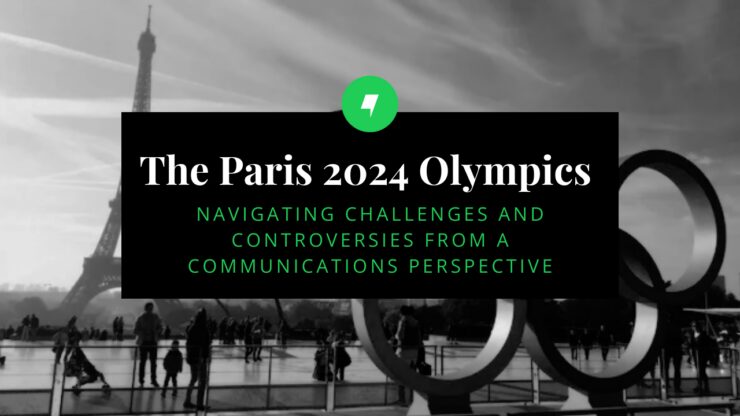Every four years, the world turns its attention to the Olympics and the host city. This year, all eyes are on Paris. With thousands of athletes and even more media converging on the city, the Olympic Committee must be prepared for all potential issues.
France has faced several challenges, including complaints about Olympic Village accommodations, such as uncomfortable cardboard beds, lack of protein-rich foods, and no air conditioning to name a few. Additionally, pollution in the Seine and the controversial opening ceremony tableau have added to the scrutiny.
Let’s look at how the Olympic Committee responded to each of these issues:
- Opening Ceremonies – Balancing Artistic Expression and Cultural Sensitivities: The Paris Olympic Committee faced significant backlash from the opening ceremonies with some perceiving a tableau as a parody of Leonardo da Vinci’s “The Last Supper.” The Committee defended the performance, emphasizing their commitment to showcasing French values and principles. Artistic Director Thomas Jolly clarified that the scene was inspired by pagan feasts and French gastronomy, not by “The Last Supper,” and intended to promote inclusion and artistic freedom. Despite their intentions, the continued backlash prompted the Committee to issue an apology to those offended by the performance. This controversy highlights the challenges of balancing artistic expression with cultural sensitivities on a global stage.
- Food Shortage in Olympic Village – Rapid Response to Athletes’ Needs: The Olympic Committee’s handling of the food shortage focused on quickly addressing the athletes’ concerns by providing a variety of protein-rich foods. They showcased their commitment to address the issue through transparent communication with the media that acknowledged the problem and detailed the steps being taken to address the issue.
- Cardboard Beds – A Commitment to Sustainability: As the second Olympic host country to use cardboard bed frames, the Paris Olympic Committee knew that their predecessor, Tokyo, dealt with similar backlash. As the Paris Olympics worked to be the greenest Games ever, the beds in the Olympic Village played a large part in the effort. As social media and media reports emerged about the athletes’ experiences with the beds, the Olympic Committee’s spokesperson stayed on message, emphasizing “The choice of these beds for the Olympic and Paralympic Village is primarily linked to a wider ambition to ensure minimal environmental impact and second life for all equipment.” The spokesperson responded to further questions about the beds with: “The quality of the furniture has been rigorously tested to ensure it is robust, comfortable, and appropriate for all the athletes who will use it.”
- No Air Conditioning in Olympic Village – Balancing Comfort and Sustainability: In a media statement, officials emphasized their commitment to environmental sustainability while also addressing athletes’ concerns. The committee outlined the design for the Olympic Village included avoiding air conditioning to minimize carbon emissions. However, after pushback, they changed their stance and installed 2,500 temporary air conditioning units in the Village to address the needs of the athletes.
- Pollution in the Seine – Addressing Environmental and Health Concerns with Commitment to Athletes: The Seine River, historically unfit for swimming due to E.coli and other micro-organisms, received a $1.5 billion investment to make it fit for the Olympic events. Despite the efforts, if mother nature brings heavy rain, sewage runoff can overwhelm the new water treatment system. This might have been the cause for the increase in E. coli that caused the Olympics to postpone the men’s individual triathlon race.
During the first week of the Olympics, the World Triathlon provided a transparent statement noting that the men’s triathlon event was postponed as water quality tests were conducted. In addition to the details, they also outlined the commitment along with the Olympic Committee’s to the health of the athletes.
As questions continued to arise, the World Triathlon and Olympic Committee shared the water quality would be tested each morning before the events to ensure safety. If the water quality doesn’t improve, the contingency plan was to move “as a final resort, for the competition to be held in a duathlon format.”
This issue showcases how nature can impact the Olympics and the importance of transparent communication to prevent false information from spreading across the globe.
Every two years, the winter and summer Olympics bring expected and unexpected issues for the Olympic Committee. Hosts must be prepared for the known and unknown. Just as first responders practice for various scenarios, so must the communications teams for the Olympics, the host city, and partnership organizations like the World Triathlon. This preparation ensures a seamless process when a crisis and subsequent media flurry begins.
The Paris 2024 Olympics have demonstrated the complexities and challenges of hosting a large-scale international event. From addressing accommodation complaints to managing environmental concerns, the Olympic Committee’s responses have shown the importance of transparency, responsiveness, and a commitment to both sustainability and the well-being of the athletes. As the Games continue, these lessons will undoubtedly guide future host cities in navigating the challenges and controversies that come with hosting the Olympics.
Posted In Media Relations, Public Relations
 Veronica Mikitka Reed
Veronica Mikitka Reed 